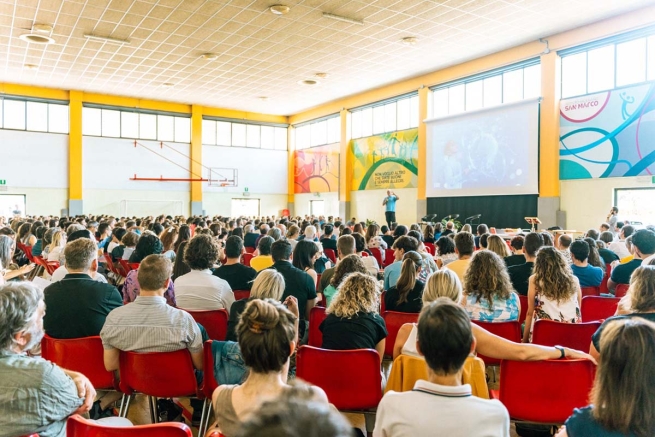The day began with a moment of prayer led by Fr Luca Bernardello, vocational animator, on the theme of the Jubilee of Hope, inspired by the words of Pope Francis. Then followed the introductory greetings by Fr Silvio Zanchetta, Provincial, Fr Lorenzo Teston, Provincial Delegate for schools, and Professor Alberto Grillai, Delegate for Vocational Training. The greetings offered an overview of the main theme of the meeting, Artificial Intelligence (AI), as a potential opportunity for education. The speakers highlighted how AI can be a valuable resource for improving learning and teaching, although deep reflection is needed on its ethical and pedagogical implications.
AI is increasingly present in our lives and, inevitably, also enters the world of education. During the first address, Fr Mariano Diotto highlighted how AI can be both an opportunity and a challenge for educators. He outlined the historical path of AI, starting from the Dartmouth Conference of 1956, where the term "Artificial Intelligence" was coined for the first time, up to the current applications involving machine learning and machine learning.
One of the highlights of the discussion was the comparison between the human brain and AI. The human brain, with its ability to make thousands of decisions every day and to synthesise information very quickly, remains the irreplaceable tool of education. However, the increasing ability of AI to analyse and process large amounts of data raises important questions about how these technologies can support or, in some cases, replace certain aspects of human thinking.
Fr Diotto explained how multitasking, often facilitated by the use of technology, can actually reduce students' ability to concentrate and filter relevant information from irrelevant ones. This phenomenon highlights the importance of an education that not only integrates technology, but that does so critically and consciously.
Following Fr Diotto's address, Fr Vincenzo Salerno expanded the discourse by introducing crucial reflections on education in the context of cyberculture and AI. Fr Salerno highlighted how today's technologies, in particular information technology, have radically transformed the way we live and educate. The pervasiveness of technologies in everyday life, and their ability to interconnect local cultures with a global cybernetic culture, leads to living in a time when social interactions and learning modes are deeply influenced by cyberspace.
He then stressed how the speed of technological change and the evolution of Information and Communication Technologies (ICT) have led to new forms of interaction between humans and machines, such as "social robotics": robots designed to interact in a socially significant way, assuming roles ranging from health care to education.
Fr Salerno also drew attention to the impact of converging technologies, such as nanotechnology and biomedicine, which are changing the body in unprecedented ways. He also raised important questions about the possibility that AI can develop a kind of moral autonomy, transforming machines from simple tools to real moral actors.
Finally, Fr Salerno stressed the importance of a balanced approach which recognises the potential of digital technologies without neglecting the need to preserve and promote fundamental human values. Digital humanism, according to Fr Salerno, offers an ethical framework that invites us to use technologies to enrich human life, rather than letting them take over.
In conclusion, while on the one hand AI can offer valuable tools for learning, on the other hand it is essential to maintain a critical and aware vision, to prevent technology from taking over fundamental human values.
The day ended with the Eucharist, celebrated by Fr Zanchetta, which was a moment of union and spiritual reflection, underlining the importance of keeping Christian values central in the educational path, also in the face of the challenges posed by new technologies.
Source: Salesiani Nord-Est


